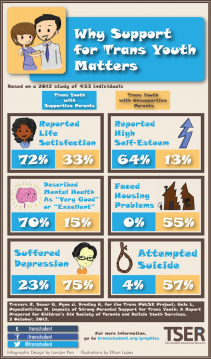By Luke Grayson
More than 50 percent of transgender youth will attempt suicide at least once by their 20th birthday.
This week marks the fourth trans kid that I have known to be in the ICU for a suicide attempt, the second in the last six weeks. Fighting nurses and doctors at nearly every interaction just to get the correct pronouns used, flipping over the wristband that says the wrong name and sex to keep another meltdown from happening, educating the nurses while the kid sleeps, correcting pronouns some more. And that’s just day one.
They have made a list of reasons they want to die and more than half of them have to do with how extended family, school administrators and peers have responded to their transition.
It’s unclear how many transgender youth (those under age 18) there are exactly because many choose not to transition until after age 18 due to family acceptance, school, or just general uncertainty because they don’t have the words to describe how they feel. It is estimated that there are about 1.4 million adults, or .06 percent of the overall population, in the U.S identifying openly as transgender.
Nov. 19 the Spokane community will remember all the transgender people who have been lost in the past year, whether from suicide or homicide. Every year the number rises and every year we have fewer people left to represent and advocate because of hatred and a lack of mental health services. Last year was the first year that many organizations acknowledged those who committed suicide out of fear that it would cause more to attempt it. Honestly, I haven’t looked at this year’s count primarily out of trying to keep from scaring myself about my odds of being murdered or getting bad enough that I try to kill myself again.
How can you help? How can you be an effective ally?
It all boils down to respecting the person as they are. When you meet someone and learn their name, ask what their pronouns are. Even if you’re not sure if they are transgender, it’ll go a long way. Some people may look at you funny at first, but the transgender people you interact with will remember it. If you catch yourself using the wrong pronouns, apologize and correct yourself and then move on. If you get corrected again, apologize, correct yourself and move on. Correct other people when you hear them get it wrong, unless the person has asked you to not correct someone or you’re not sure if they’re fully out.
If someone you know comes out as transgender, do your best to change to the name and pronouns they ask. Even if they’re not around, especially if they’re not around.
Most importantly, listen and look something up if you’re not sure. Transgender people are not your dictionary. If they’ve said they’re OK with you asking questions or if they’ve said nothing, ask if it’s OK to ask a question. Don’t ask about surgeries or hormones or “what parts” someone has, those are just inappropriate. Basically, if you wouldn’t ask a cisgender (non-transgender) person the same question, it’s probably not appropriate.
Cisgender/cis: term for someone who exclusively identifies as their sex assigned at birth. The term cisgender is not indicative of gender expression, sexual orientation, hormonal makeup, physical anatomy, or how one is perceived in daily life.
Transgender/Trans: encompassing term of many gender identities of those who do not identify or exclusively identify with their sex assigned at birth. The term transgender is not indicative of gender expression, sexual orientation, hormonal makeup, physical anatomy, or how one is perceived in daily life.
Queer: A term for people of marginalized gender identities and sexual orientations who are not cisgender and/or heterosexual. This term has a complicated history as a reclaimed slur.
Gender Expression/Presentation: The physical manifestation of one’s gender identity through clothing, hairstyle, voice, body shape, etc. (typically referred to as masculine or feminine). Many transgender people seek to make their gender expression (how they look) match their gender identity (who they are), rather than their sex assigned at birth. Someone with a gender nonconforming gender expression may or may not be transgender.
Gender Identity: One’s internal sense of being male, female, neither of these, both, or other gender(s). Everyone has a gender identity, including you. For transgender people, their sex assigned at birth and their gender identity are not necessarily the same.
Transition: A person’s process of developing and assuming a gender expression to match their gender identity. Transition can include: coming out to one’s family, friends, and/or co-workers; changing one’s name and/or sex on legal documents; hormone therapy; and possibly (though not always) some form of surgery. It’s best not to assume how one transitions as it is different for everyone.
Transsexual: A depreciated term (often considered pejorative) similar to transgender in that it indicates a difference between one’s gender identity and sex assigned at birth, with implications of hormonal/surgical transition from one binary gender (male or female) to the other. Unlike transgender/trans, transsexual is not an umbrella term, as many transgender people do not identify as transsexual. When speaking/writing about trans people, please avoid the word transsexual unless asked to use it by a transsexual person.
Ally: Someone who advocates and supports a community other than their own. Allies are not part of the communities they help. A person should not self-identify as an ally but show that they are one through action.
Gender Dysphoria: Anxiety and/or discomfort regarding one’s sex assigned at birth.
Nonbinary (Also Non-Binary): Preferred umbrella term for all genders other than female/male or woman/man, used as an adjective (e.g. Jesse is a nonbinary person). Not all nonbinary people identify as trans and not all trans people identify as nonbinary. Sometimes (and increasingly), nonbinary can be used to describe the aesthetic/presentation/expression of a cisgender or transgender person.









Those numbers are so sad. Luke, thank you for all your hard work in spreading awareness!